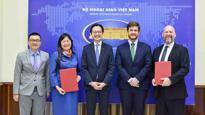

History and Development
The East Sea (South China Sea) Institute was officially established under Decision No. 29/2012/QD-TTg dated 12 July 2017 by the Prime Minister (which entered into force as of 01 September 2012) as a research institute within the Diplomatic Academy of Viet Nam. Its predecessor is the Program for East Sea Studies and, later, the Center for East Sea Studies (established on 14 December 2001 pursuant to the Decision No. 635/QD-BNG by the Minister of Foreign Affairs of Viet Nam) under the Institute for Foreign Policy and Strategic Studies, Diplomatic Academy of Viet Nam.
Organizational Structure, Functions and Missions
The East Sea Institute has four (04) centers, namely, Center for Policy Studies, Center for Legal Studies, Center for International Cooperation, and Center for Information and Analysis. The East Sea Institute also has working groups to focus on different geographical regions, namely: Southeast Asia Group, China Group, US-EU Group, Middle Powers Group, and other working groups for specialized areas.
Five main functions of the East Sea Institute include (1) Doing Researches; (2) Policy recommendation; (3) Track II diplomacy; (4) Public communication; and (5) Resource mobilization. The major routine tasks of the East Sea Institute are as follows: (i) making researches and policy recommendations on the protection of Viet Nam’s interests and sovereignty; (ii) providing situation analyses and assessments to other agencies and leaders of the Ministry of Foreign Affairs and higher; (iii) promoting cooperation in the East Sea in the political-security and legal areas; (iv) carrying out academic activities and cooperation on the East Sea; (v) disseminating information on issues in the East Sea; (vi) collecting and utilizing documents and materials on the East Sea; and (vii) acting as a focal point of coordination for domestic organizations, agencies, and Vietnam’s diplomatic missions.
Outstanding accomplishments
Since its establishment in 2008, East Sea Institute has made many contributions with great wealth of successes by: (i) organizing a number of international conferences inside and outside Vietnam, especially the series of South China Sea Conferences – the annual international-level event, drawing the attention of both politicians and scholars from all over the world; (ii) holding seminars to provide information and discussions on the situation of the East Sea; (iii) conduct academic exchanges with foreign agencies; (iv) establish and maintain a website of East Sea studies and a documentation center which contains comprehensive and up-to-date information about South China Sea with more than 200 different books, articles, and thousands of e-documents; and (v) building a network of research institutes and prestigious scholars over the world. Researchers of the East Sea Institute have proactively participated in and made presentations at various international conferences, having written and published researches and articles relating to East Sea in the prestigious scientific publishers and magazines inside and outside Viet Nam.
With proactive performance during recent years, East Sea Institute has gradually proved itself as one of Viet Nam’s foremost East Sea research institutes. It has gained important recognition on the international and regional arena.
Current Leadership of the East Sea Institute:
PhD. Nguyen Hung Son, Director-General of East Sea Institute
PhD. To Anh Tuan, Deputy Director-General of East Sea Institute
PhD. Lai Thai Binh, Deputy Director-General of East Sea Institute
PhD. Nguyen Nam Duong, Deputy Director-General of East Sea Institute
PhD. Ha Anh Tuan, Assistant Director-General, Director of Center for Policy Studies
PhD. Do Thanh Hai, Assistant Director-General, Director of Center for Information and Analysis.